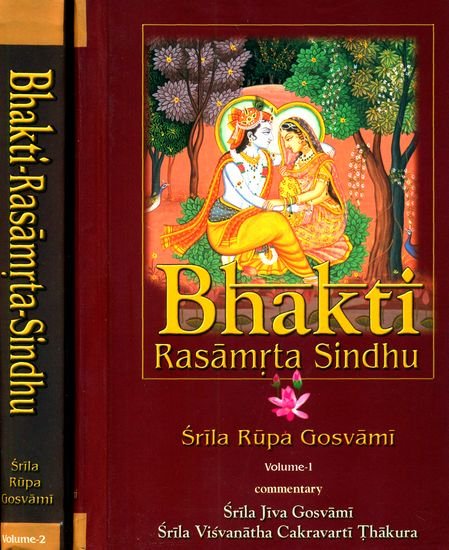Bhakti-rasamrta-sindhu
by Śrīla Rūpa Gosvāmī | 180,912 words
The English translation of the Sri Bhakti-rasamrta-sindhu verse 3.2.143; a medieval era Sanskrit book, written by Rupa Goswami (fl. 15th century) which represents a devotional (bhakti) masterpiece. In this work Goswami describes the nature and different forms of pure love (rasa) as well as various other topics on Vaishnavism and devotion.
Verse 3.2.143
Sanskrit text, Unicode transliteration and English translation:
सप्तमे च (७.७.३४) —
निशम्य कर्माणि गुणान् अतुल्यान्
वीर्याणि लीला-तनुभिः कृतानि ।
यदातिहर्षोत्पुलकाश्रु-गद्गदं
प्रोत्कण्ठ उद्गायति रौति नृत्यति ॥३.२.१४२॥saptame ca (7.7.34) —
niśamya karmāṇi guṇān atulyān
vīryāṇi līlā-tanubhiḥ kṛtāni |
yadātiharṣotpulakāśru-gadgadaṃ
protkaṇṭha udgāyati rauti nṛtyati ||3.2.142||
English translation
Sanskrit text, Unicode transliteration and English translation:
अल्सो इत् इस् स्ततेद् इन् थे सेवेन्थ् चन्तो [७.७.३४]:
“ओने wहो इस् सितुअतेद् इन् देवोतिओनल् सेर्विचे इस् चेर्तैन्ल्य् थे चोन्त्रोल्लेर् ओf हिस् सेन्सेस्, अन्द् थुस् हे इस् अ लिबेरतेद् पेर्सोन्. Wहेन् सुछ् अ लिबेरतेद् पेर्सोन्, थे पुरे देवोतेए, हेअर्स् ओf थे त्रन्स्चेन्देन्तल् qउअलितिएस् अन्द् अच्तिवितिएस् ओf थे लोर्द्ऽस् इन्चर्नतिओन्स् fओर् थे पेर्fओर्मन्चे ओf वरिओउस् पस्तिमेस्, हिस् हैर् स्तन्द्स् ओन् एन्द् ओन् हिस् बोद्य्, तेअर्स् fअल्ल् fरोम् हिस् एयेस्, अन्द् इन् हिस् स्पिरितुअल् रेअलिzअतिओन् हिस् वोइचे fअल्तेर्स्. सोमेतिमेस् हे वेर्य् ओपेन्ल्य् दन्चेस्, सोमेतिमेस् हे सिन्ग्स् लोउद्ल्य्, अन्द् सोमेतिमेस् हे च्रिएस्. थुस् हे एxप्रेस्सेस् हिस् त्रन्स्चेन्देन्तल् जुबिलतिओन्.”
एषात्र भक्ताभावानां प्रायकी प्रक्रियोदिता ।
किन्तु कालादि-वैशिष्ठ्यात् क्वचित् स्यात् सीम-लङ्घनम् ॥३.२.१४३॥Also it is stated in the Seventh Canto [7.7.34]:
“One who is situated in devotional service is certainly the controller of his senses, and thus he is a liberated person. When such a liberated person, the pure devotee, hears of the transcendental qualities and activities of the Lord's incarnations for the performance of various pastimes, his hair stands on end on his body, tears fall from his eyes, and in his spiritual realization his voice falters. Sometimes he very openly dances, sometimes he sings loudly, and sometimes he cries. Thus he expresses his transcendental jubilation.”eṣātra bhaktābhāvānāṃ prāyakī prakriyoditā |
kintu kālādi-vaiśiṣṭhyāt kvacit syāt sīma-laṅghanam ||3.2.143||
English translation
“The usual emotions of the dāsya-bhava have been given in these verses. There will be exceptions to the general behavior at particular times.”
